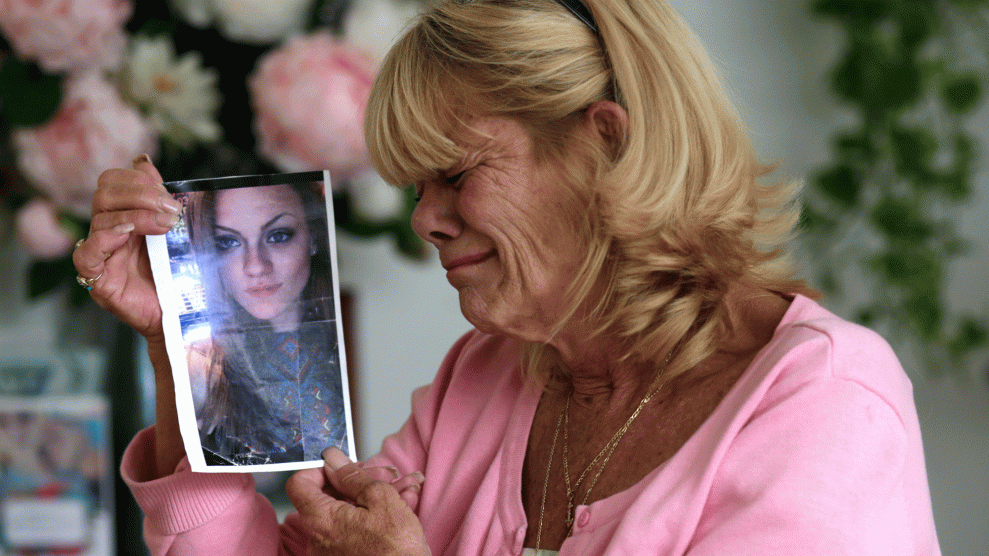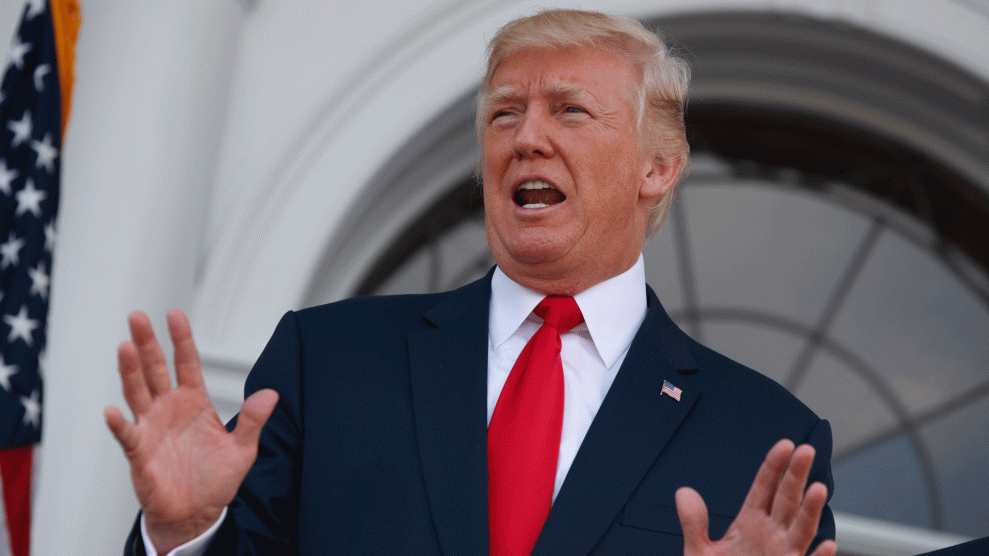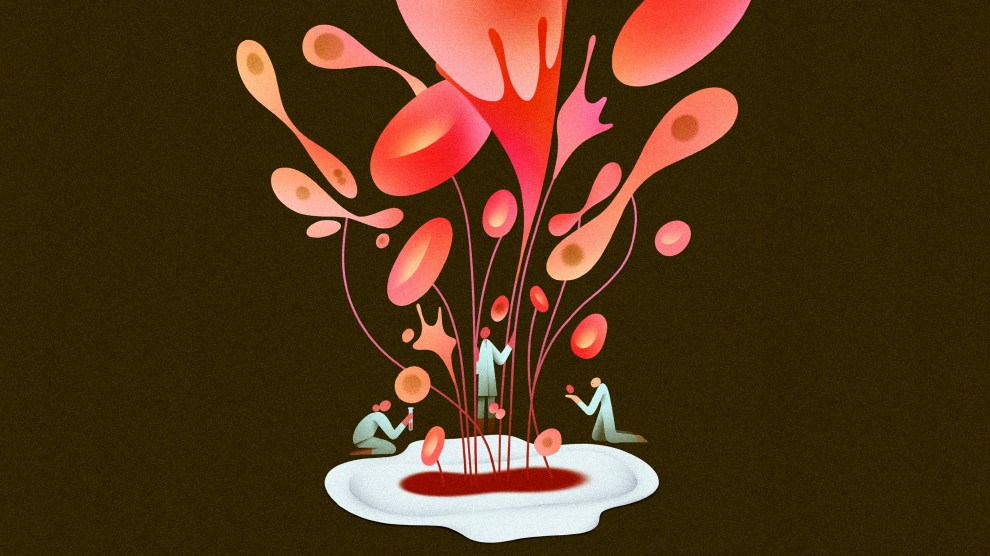Heroin(e), the Netflix short documentary released Tuesday, begins and ends with blaring sirens as fire chief Jan Rader responds to yet another overdose in Huntington, West Virginia. The town has been called the “overdose capital of America,” and for good reason: Every resident, it seems, is affected by the ravages of opioids, from the gas station employees who keep ringing up customers as first responders revive an overdose victim in the checkout line, to the homeless drug users encamped by the river, to the church shelter employees urging users to come in for the night.
Despite the grave subject matter, the film, a collaboration with the Center for Investigative Reporting, is refreshingly hopeful as it tracks the work of three women on the front lines of the crisis. There’s Rader, an effusive nurse and firefighter who became the state’s first female fire chief earlier this year. There’s Judge Patricia Keller, who presides over the town’s drug court—the largest in the state. And there’s Necia Freeman, a resident who’s taken to driving around the town at night, helping provide food and shelter for sex workers who are addicted to drugs.
For Elaine McMillon Sheldon, the 29-year-old Peabody award-winning director and West Virginia native, the issue is personal. “I’ve lost friends. I have friends and classmates that are in prison, in recovery, in rehab, still addicted,” she says. “It’s just an issue I couldn’t ignore any longer.”
I spoke with Sheldon about the challenges of documenting such a stigmatized issue, the film’s political context, and how she hopes to change viewers’ preconceptions about the most deadly drug epidemic in the nation’s history.
Mother Jones: The film highlights the work of Jan Rader. Tell me a little bit about her.
Elaine McMillon Sheldon: Jan Rader is a nurse, a medic, and a firefighter. She’s the only woman of the nearly 100-firefighter fire department in Huntington, West Virginia. She’s an incredibly caring and energetic and driven and empathetic person. She is responsible for making sure all the men on the fire department stay empathetic, which is a challenge in this situation. There’s a lot of PTSD associated with the fact that they are sometimes reviving the same person three to four times in a month. A lot of the people on the squad are becoming quite callous to the situation, understandably. I’m sure you read recently about the Ohio town [council member] who has proposed to only respond to three overdoses per person before they don’t respond anymore.
MJ: This is different from a lot of the existing media on the opioid epidemic—it’s less full of history and stats, and far more hopeful.
EMS: We really wanted it to feel like you were moving from place to place with these women, and you’re getting a sense of their daily grind. And I think just observing people doing their work, and sometimes failing, not always succeeding, is an important thing to show. We never approached it as an opioid film. I think there are plenty of pieces that do that and do it well, and we wanted to really highlight the work of individuals.
MJ: You show people in really vulnerable situations—especially during the overdose and drug court scenes. How did you balance respect of people’s privacy on the one hand and exposing this problem on the other?
EMS: It’s a hard thing to know the line between sharing a story that will make an impact and exploiting someone’s worst moment of their life. And at the end of the day, I live in West Virginia, I shop at the same stores as these people. I have to look all the people that I’ve documented in the eye and know that I’ve treated them with the utmost respect.
MJ: This film is obviously being released in a really contentious political environment—one where Trump has been criticized for failing to act on the opioid epidemic. Talk about how the the stories that you heard on the ground contrast with the rhetoric you’re hearing at a national level.
EMS: I don’t see this issue as political—I think it’s a public health issue. We have to have a concerted effort to provide more resources to every state. I don’t know if President Trump’s commission that he’s put together is going to help that situation. I mean, there’s less than 200 detox beds in the entire state of West Virginia. There’s no way we can fight this problem with the current resources we have, and we’re in a massive budget deficit in the state of West Virginia. Two people die every single day in this one tiny state, and the surrounding states are just as bad, if not worse.
MJ: There’s a lot of stigma out there about drug users. People say they don’t deserve help or they chose this life. How do you handle those preconceptions when making a film like this?
EMS: I say oftentimes that I make films for my parents. Where my parents live, the holler right next to them is clearly full of several dealers and users. They had a very negative feeling toward drug users, because they’ve had people—their friends—impacted, whether it’s been things stolen or break-ins that actually injured people. Now, the difference is they see it as, does that person need help? Potentially that person doesn’t want to be in the situation they’re in. There’s choice in this, [but] there’s also brain science and there’s also addiction at play. My parents have a greater sense of understanding of what people are up against when they’re addicted to a drug as powerful as heroin and how sometimes, [users] don’t even have a decision-making process because their brain chemistry has changed so much.
MJ: This is a film about one town, but this issue is obviously affecting every corner of the country. While I was watching this film, my colleague reached out because she was concerned that someone on the street outside had just overdosed.
EMS: It’s so common. That’s why the scene in [the gas station], when the woman overdoses and people just continue to check out, that was one of the most haunting things—more than the actual overdose—was just seeing people continue their daily lives while someone’s being revived next to them. That’s how normal it’s become. Some American communities haven’t seen that yet, but I think that for some of us, that’s just the reality. You have to resist that temptation to become numb, and really have a conversation that not only talks about this problem but includes the people that are trapped in addiction in the conversation. I think that’s essential.















